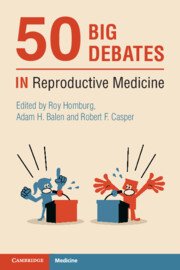Book contents
- 50 Big Debates in Reproductive Medicine
- Series page
- 50 Big Debates in Reproductive Medicine
- Copyright page
- Contents
- Contributors
- Foreword
- Introduction
- Section I Limits for IVF
- Section II IVF Add-ons
- Section III The Best Policy
- 14A IVF Should Be First-Line Treatment for Unexplained Infertility of Two Years Duration
- 14B IVF Should Be First-Line Treatment for Unexplained Infertility of Two Years Duration
- 15A Single Embryo Transfer Should Be Performed in All IVF Cycles
- 15B Single-Embryo Transfer Should Be Performed in All IVF Cycles
- 16A The Freezing of All Embryos Should Be Used for All IVF Cycles
- 16B The Freezing of All Embryos Should Be Used for All IVF Cycles
- 17A Luteal-Phase Support Should Be Stopped at the Time of a Positive Pregnancy Test
- 17B Luteal Phase Support Should Be Stopped at the Time of a Positive Pregnancy Test
- 18A A Natural Cycle Is the Best Protocol for Frozen Embryo Replacement
- 18B A Natural Cycle Is the Best Protocol for Frozen Embryo Replacement
- 19A All Pregnancies Conceived by IVF Should Be Delivered by Caesarean Section
- 19B All Pregnancies Conceived by IVF Should Be Delivered by Caesarean Section
- 20A Endometriosis Should Be Suppressed for 6–12 Weeks before Frozen Embryo Transfer
- 20B Endometriosis Should Be Suppressed for 6–12 Weeks before Frozen Embryo Transfer
- 21A Infertile Patients with Endometriosis Benefit from Surgery
- 21B Infertile Patients with Endometriosis Benefit from Surgery
- 22A Intramural Fibroids Greater than 4 cm in Diameter Should Be Removed to Aid Fertility
- 22B Intramural Fibroids Greater than 4 cm in Diameter Should Be Removed to Aid Fertility
- 23A All Infertile Women with a Uterine Septum Should Have a Surgical Removal
- 23B All Infertile Women with a Uterine Septum Should Have a Surgical Removal
- Section IV Embryology
- Section V Ethics and Statistics
- Section VI Male-factor Infertility
- Section VII Genetics
- Section VIII Ovarian Stimulation
- Section IX Hormones and the Environment
- Index
- References
20B - Endometriosis Should Be Suppressed for 6–12 Weeks before Frozen Embryo Transfer
Against
from Section III - The Best Policy
Published online by Cambridge University Press: 25 November 2021
- 50 Big Debates in Reproductive Medicine
- Series page
- 50 Big Debates in Reproductive Medicine
- Copyright page
- Contents
- Contributors
- Foreword
- Introduction
- Section I Limits for IVF
- Section II IVF Add-ons
- Section III The Best Policy
- 14A IVF Should Be First-Line Treatment for Unexplained Infertility of Two Years Duration
- 14B IVF Should Be First-Line Treatment for Unexplained Infertility of Two Years Duration
- 15A Single Embryo Transfer Should Be Performed in All IVF Cycles
- 15B Single-Embryo Transfer Should Be Performed in All IVF Cycles
- 16A The Freezing of All Embryos Should Be Used for All IVF Cycles
- 16B The Freezing of All Embryos Should Be Used for All IVF Cycles
- 17A Luteal-Phase Support Should Be Stopped at the Time of a Positive Pregnancy Test
- 17B Luteal Phase Support Should Be Stopped at the Time of a Positive Pregnancy Test
- 18A A Natural Cycle Is the Best Protocol for Frozen Embryo Replacement
- 18B A Natural Cycle Is the Best Protocol for Frozen Embryo Replacement
- 19A All Pregnancies Conceived by IVF Should Be Delivered by Caesarean Section
- 19B All Pregnancies Conceived by IVF Should Be Delivered by Caesarean Section
- 20A Endometriosis Should Be Suppressed for 6–12 Weeks before Frozen Embryo Transfer
- 20B Endometriosis Should Be Suppressed for 6–12 Weeks before Frozen Embryo Transfer
- 21A Infertile Patients with Endometriosis Benefit from Surgery
- 21B Infertile Patients with Endometriosis Benefit from Surgery
- 22A Intramural Fibroids Greater than 4 cm in Diameter Should Be Removed to Aid Fertility
- 22B Intramural Fibroids Greater than 4 cm in Diameter Should Be Removed to Aid Fertility
- 23A All Infertile Women with a Uterine Septum Should Have a Surgical Removal
- 23B All Infertile Women with a Uterine Septum Should Have a Surgical Removal
- Section IV Embryology
- Section V Ethics and Statistics
- Section VI Male-factor Infertility
- Section VII Genetics
- Section VIII Ovarian Stimulation
- Section IX Hormones and the Environment
- Index
- References
Summary
Endometriosis-associated infertility is a common indication for in vitro fertilisation (IVF) treatment. There is great controversy regarding the outcome of IVF in such patients. Possibly inferior results compared with other indications for IVF are likely based on reduced oocyte and embryo quality and not adverse endometrial receptivity. Such knowledge is based on IVF crossover studies with donor oocytes and patient’s own oocytes to women with and without endometriosis. Embryos that are frozen and later thawed for transfer to the uterus are selected among the best embryos in a fresh cycle. Transfer of such embryos is as successful in endometriosis as in other causes of infertility whatever endometrial preparation is used. Thus, long-term suppression of endometriosis with GnRH agonists in frozen embryo transfer is unnecessary and may possibly be harmful due to induction of endometritis.
- Type
- Chapter
- Information
- 50 Big Debates in Reproductive Medicine , pp. 109 - 110Publisher: Cambridge University PressPrint publication year: 2021



